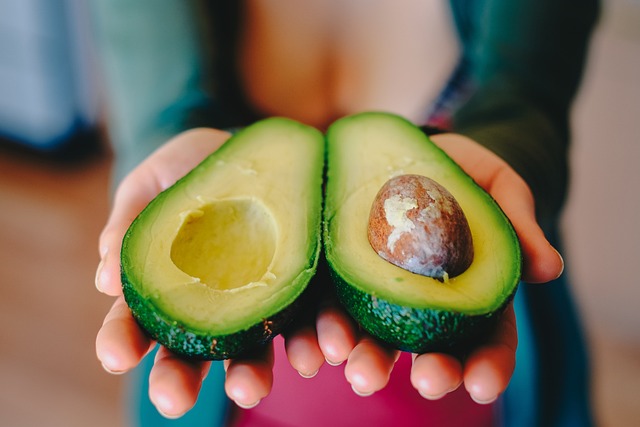Introduction
Avocados are not only delicious but also incredibly nutritious fruits that offer a wide range of health benefits. Packed with essential vitamins, minerals, and healthy fats, avocados have become a popular superfood in recent years. In this article, we will explore the various avocado benefits and why you should consider adding them to your diet.
Why are avocados good for you?

Image by Juraj Varga from Pixabay
Monounsaturated fats, which lower bad cholesterol and lower the risk of heart disease, are found in abundance in avocados. Additionally, avocados are a good source of fiber, which can aid in digestion and promote a feeling of fullness. They also contain an array of vitamins and minerals, including vitamin K, vitamin E, vitamin C, and potassium and many other avocado benefits.
How do avocado benefits your health?
Weight Management

Image by PublicDomainPictures from Pixabay
Despite their high fat content, avocado benefits can actually help with weight loss. The monounsaturated fats in avocados can increase feelings of fullness, which may prevent overeating.
Heart Health

Image by Gerd Altmann from Pixabay
Avocados are excellent for heart health due to their high monounsaturated fat content, which can help lower bad cholesterol levels and reduce the risk of heart disease.
Avocado benefits are a powerhouse of nutrients that are beneficial for heart health. Because of their high content of monounsaturated fats, they may help lower bad cholesterol and lower the risk of heart disease. Including avocados in your diet can have a positive impact on your heart health, making them an excellent choice for maintaining a healthy lifestyle. Incorporating avocados into your meals can provide you with essential nutrients while also supporting your heart health in the long run.
Digestive Health

Image by Gerd Altmann from Pixabay
The fiber in avocados can aid in digestion and promote bowel regularity. By doing this, constipation and other digestive problems may be avoided.
Avocado benefits are packed with fiber, which is great for digestive health. The fiber in avocados can aid in digestion and promote regularity, helping to prevent constipation and other digestive issues. By incorporating avocados into your diet, you can support a healthy gut and overall digestive system. So, next time you’re looking for a delicious and nutritious snack, reach for an avocado give your digestive health a boost!
Skin Health

Avocados are a great source of vitamin E, which is essential for healthy skin. Vitamin E is an antioxidant that can help protect your skin from damage caused by free radicals.
Avocado benefits offer various advantage for skin health. They are rich in vitamin E, an essential nutrient that acts as an antioxidant, safeguarding the skin against damage from free radicals. Consuming avocados can promote healthy skin by nourishing it with the protective properties of vitamin E. This nutrient helps in maintaining the skin’s elasticity and overall health, making it a valuable addition to your diet for glowing and youthful skin. Including avocados in your meals can contribute to your skin’s well-being and protection against environmental stressors.
Eye Health

Image by Aamir Mohd Khan from Pixabay
Avocado benefits contain lutein and zeaxanthin, two antioxidants that are beneficial for eye health. These antioxidants can help reduce the risk of age-related macular degeneration.
Avocados are a superfood known for their numerous health benefits, especially when it comes to eye health. Packed with lutein and zeaxanthin, two powerful antioxidants, avocados can help protect your eyes from age-related macular degeneration. By incorporating avocados into your diet, you can ensure that your eyes stay healthy and reduce the risk of developing vision problems as you age. So, next time you’re looking for a nutritious snack or ingredient to add to your meal, reach for an avocado and give your eyes the care they deserve.
How can you incorporate avocados into your diet?
Avocados are incredibly versatile and can be enjoyed in a variety of ways. Here are some ideas for incorporating avocados into your diet:
Avocado Toast
Mash up some avocado and spread it on whole-grain toast for a healthy and delicious breakfast or snack.
Guacamole:
Whip up a batch of homemade guacamole to enjoy with veggie sticks or whole-grain chips.
Smoothies:
Add half an avocado to your morning smoothie for a creamy texture and an extra nutrient boost.
Salads:
Slice up some avocado and add it to your favorite salads for a dose of healthy fats and vitamins.
Conclusion
In conclusion, avocados are a nutrient-packed superfood that can offer a wide range of health benefits. From weight management to heart health to skin health, avocados have something to offer everyone. So make sure to grab some avocados the next time you’re at the grocery store so you can begin enjoying the health benefits of this delicious fruit. Discover the amazing benefits of avocados, from heart health to skin health. Learn how to incorporate this nutrient-packed superfood into your diet.
By incorporating avocado benefits into your daily diet, you can enjoy a myriad of health benefits and improve your overall well-being. So go ahead, indulge in this delicious superfood and reap the rewards of a healthier lifestyle.
FAQ’s
Is eating avocados every day a good idea?
Avocados offer a plethora of benefits that make them a great addition to your daily diet. Rich in healthy fats, fiber, and various vitamins and minerals, avocados can help improve heart health, aid in weight management, and promote healthy skin. Consuming avocados daily can provide essential nutrients such as potassium, vitamin K, and folate, which are vital for overall well-being. However, moderation is key due to their high calorie content, so it’s best to enjoy avocados in balanced portions as part of a diverse and nutritious diet to maximize their benefits.
Do avocados burn belly fat
Avocados are often touted as a superfood due to their numerous health benefits, but can they specifically target belly fat? While avocados are a nutritious addition to a balanced diet, there is no scientific evidence to support the claim that they can directly burn belly fat.
On the other hand, avocados are an excellent source of fibre, healthy fats, and other nutrients that help promote general health and weight loss. Incorporating avocados into a well-rounded diet along with regular exercise and a healthy lifestyle may help in reducing belly fat over time.
Remember, no single food can target belly fat alone, and a holistic approach including a balanced diet and regular physical activity is key to achieving and maintaining a healthy weight.
When is the optimal time to consume avocado?
The best time to eat avocado is during breakfast or lunch. Avocados are a versatile ingredient that can be incorporated into various meals throughout the day, but consuming them earlier in the day allows your body to fully utilize their nutrients and healthy fats. Avocado can add long-lasting energy and satiety to your morning salad, toast, or smoothie, making you feel fuller for longer. Additionally, the monounsaturated fats in avocados can support heart health and help regulate blood sugar levels, making them a nutritious choice for the start of your day.
What are avocado benefits and drawbacks?
Avocado benefits offer numerous advantages, including being packed with healthy monounsaturated fats, fiber, and vitamins like vitamin K, vitamin E, and vitamin C. They also contain more potassium than bananas, which is beneficial for heart health and lowering blood pressure. Avocado benefits can help with weight management, skin health, and even improving digestion due to their high fiber content.
However, there are a few disadvantages to consider. Avocados are high in calories and fat, so consuming them in excess can lead to weight gain if not balanced with other aspects of a healthy diet. Some people may also be allergic to avocados, experiencing symptoms like itching, swelling, or hives. Additionally, the production and transportation of avocados can have negative environmental impacts, including deforestation and water usage in regions where they are grown.
Read More: https://voiceoffolks.com/index.php/2024/03/18/dietary-guidelines-for-indians/






